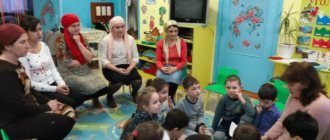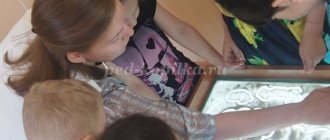Training for children 5-6 years old “The Art of Communication”
Goal: bringing children together emotionally and improving the ability to openly express their feelings, the ability to say kind words and wishes, as well as the ability to show empathy.
Materials: magic wand, butterfly, tape recorder, sheets of paper with images of blots.
Progress of the lesson.
Psychologist: Hello guys! I'm very glad to see you all. Now we will greet each other. But we will greet not with words, but with our hands. Close your eyes. I will touch the one sitting to my right. He will accept my greeting and pass it on to his neighbor in the same way - he will touch him. And so on, until my greeting comes back to me again, only from the other side. Amazing! And now we will play the game “Praise your neighbor.”
Children: Each child praises his neighbor on the right, the last one praises the psychologist.
Psychologist: Well done guys! You tried very hard to praise your neighbor, and for this I, with the help of this magic wand, will take you to the ball, where there are many butterflies, dragonflies, beetles, mosquitoes and other insects.
(The psychologist waves his magic wand and the children are transported to a fairyland to the sound of magical music.)
Psychologist: Oh guys! And who is this lying on our earth?
Children: It's a butterfly!
Psychologist: Yes, it really is a butterfly. But why doesn't she fly? Let's go up to her and see if she needs our help. (Children together with a psychologist approach the butterfly, the psychologist takes it in his hands). Guys, her wing is broken. Let's help her. Let each of you tell her your wish. (Children pass the butterfly to each other and express their wishes).
Psychologist: Well, guys, look, you cured the butterfly and now it can fly. (The psychologist lets go of the thread and shows the children how a butterfly flies). Now guys, close your eyes and imagine that you have turned into the same beautiful butterflies. (Music plays, children begin to move around the room pretending to fly butterflies. The music fades out)
Psychologist: Guys, while you were depicting the flight of a butterfly, my magic wand moved us to the country of “Klyasography”. Look, the blots are lazy and don’t want to do anything. Let's help them. (Sheets of paper with images of blots lie on the carpet). Choose any blot and turn it into something interesting. (Music plays, to the sound of which the children complete the details so that the blot becomes a character. At the end of the work, everyone examines the drawings, the psychologist praises the children.)
Psychologist: Well done guys! But it’s time for you and me to return to kindergarten. (Children sit in their seats. Close their eyes and, to the music, the magic wand returns them home.)
Psychologist: Guys, you liked our trip.
Children: Yes!
Psychologist: What did you like most about fairyland?
Children: give their own answers.
Psychologist: Our lesson is coming to an end. I thank you all. It was a pleasure to work with you. And now we will pass each other a magic wand and say which magical country you would like to go to next time.
Help the baby
Leading activity for school-age children, and especially in children who are in difficult life situations, and these are, as a rule, children with a psychological barrier, “closed” children who do not know how to communicate in society, is a game. And in order to break down the barrier, allow yourself to express yourself, join society and adapt faster, you definitely need play activity. It is in play that a child forgets about his problems, discovers and expresses himself, learns to look and see, listen and hear. Therefore, the proposed program is based on game exercisesaimed at ensuring the psychological comfort of the child’s stay in the group during adaptation. We adults are well aware of the importance game replays for a child. We use them often. Classes with repetitions become close and understandable for them. Information obtained through repetition is better remembered. At first, all games are suggested and conducted by an adult. Subsequently, children will increasingly ask an adult to play certain games that seem necessary to them right now.The goal of the correctional and developmental program is to unite children in a group, which involves creating a sense of belonging to the group, a positive emotional background, the ability to understand one’s emotional state and recognize the feelings of others, and the development of communication skills. At the same time, positive cooperation occurs between each child and the ideal adult, who is the leader.
Lesson form. Each lesson consists of three parts: warm-up, main and final part. Warm up. Goals: 1.Create a positive mood in the group. 2. Maintaining children’s friendly attitude towards each other during classes. 3.Development of positive self-esteem. The main self-assessment procedures are greetings and contact exercises.
Main part. The main part plays a leading role during the entire lesson. It mainly includes games aimed at correcting the emotional and personal sphere of the child. Conclusion. Goals: to create in each participant a sense of belonging to the group and to consolidate positive emotions from working in class. Completion of the lesson is ritual in nature. Conditions. During the first lesson, children are divided into two subgroups using games. If there are 20 people in a group, then in a subgroup there are 10. During the lesson, at the very beginning, children sit in a circle on chairs, which greatly facilitates their interaction and gives them a sense of community. The group adopts the rule “When one person speaks, the rest listen and accept him.” An adult needs to give children the opportunity to express their opinions and share their impressions after any exercise. Many exercises are accompanied by appropriate music. At the beginning and at the end of training sessions, sociometry of group participants is carried out. The proposed program is designed for 13 lessons, two lessons per week. It is addressed to practical psychologists.
LESSON 1. LOT. Goal : identifying a leader in the group, social association with each other. Acceptance of group rules. Development of partner communication skills.
1. Introductory conversation The psychologist offers to take their places on chairs standing in a circle and introduces them to the rules of behavior in the group. Psychologist. "Girls and boys! Once a week we will play games with you that will help you become more courageous and confident. Each lesson consists of three parts. Part 1 is called “Warm-up”. It is held in a circle, everyone sits on chairs. Warm-up is needed so that we get ready for classes, become kinder to each other, and more attentive. Part 2 is the main one. Here we can sit on chairs, stand in a circle, or sit on the carpet. We will play with each other and all together. We need to learn to understand each other. The 3rd part is the final games, saying goodbye to each other.
2 . Acceptance of group rules Guys, we will sit in a circle, which means according to a certain rule, according to the law. For those sitting in a circle, there is a rule: “When one speaks, the others listen to him and understand.” Remember the cartoon "Mowgli"? There, too, when one person spoke, the others listened attentively and did not interrupt him. For example, this is how they listened to Bagheera, the bear Baloo. And when you listen carefully, you can learn a lot of new and interesting things. Shouldn’t we, children, have such a wonderful rule?” Children's answers. (This rule is repeated and analyzed.) Girls and boys, who understood this rule? And who is going to carry it out? Great? This means that the rule will apply in our circle: “When one person speaks, the rest listen and try to understand.” It will be very good if in our classes you say what you think and feel. We will all learn this together. In conclusion, the Psychologist can play one game from the warm-up, one of the main parts (it is better if it is an already known game, for example “River”). In conclusion, we must say goodbye. This game of farewell may continue to become ritual.
3. Game “Mood Barometer”. The psychologist shows a real barometer and talks about its action. Children are invited to show their mood (like a barometer shows the weather) only with their hands: a bad mood - palms touch each other, a good mood - arms spread to the side.
4. Game "Steam Locomotive". The guys scatter to different corners of the room and choose a place for themselves - this is their station. One of the participants is a “locomotive”. His task is to go around everyone, gather passengers to the music or the famous song by M. Starokadomsky “Merry Travelers”. When the “train” has gathered everyone, the presenter can ask the child who he took first and why. This game makes it possible to determine children's choices. An assistant (in the case when the training is conducted by a psychologist, it can be an educator, teacher) writes down on paper the choice of each child.
Game "River".
The players stand in one column. The psychologist announces that they are all a big river, which in one place “spills” into two branches: two small rivers. At the beginning of the column it is necessary to place two leaders and, showing how the river “spills”, move them in different directions. The rest of the children take turns going in different directions. Everyone's wishes are taken into account. The assistant records the merging of children into subgroups. Perhaps these are future subgroups of social training.
LESSON 2. MOOD BAROMETER.
Target. Establishing contact between children.
1. “Mood barometer”. The psychologist shows a real barometer and talks about its action. Children are invited to show their mood (like a barometer shows the weather) only with their hands: a bad mood - palms touch each other, a good mood - arms spread to the side.
2. “Tender hands - kind look - pleasant smile” It is suggested to put your hands on top of the hands of the neighbor sitting on the left, look into his eyes and smile. And so on in a circle.
3. “Go away!” The psychologist suggests “acting out” your bad mood.
Psychologist . Children, show your bad mood in the game “Go Away!” To do this, meet in pairs and, joining your palms and frowning your eyebrows, angrily tell each other: “Go away!” Then go to another boy or girl.
4. “Tuh – tibi – spirit!” Psychologist. I will give you a special word now. This is a magic spell against bad mood. Start walking around the room without talking to anyone. As soon as you want to talk, stop in front of one of the children and angrily say the magic word “tuh-tibi-duh” three times. The second child should listen to you say the magic word. But if he wants, he can answer you in the same way: angrily say three times: “Tuh-tibi-spirit.” From time to time, stop in front of someone and angrily, angrily say this magic word again.
5. “Come to me!”
Psychologist. Now walk around the room and from time to time, meeting someone, say: “Come to me!” At the same time, you can smile at your friend and call him, pointing with your hands. When you approach each other, hug and shake hands.
6. “Kind warmth.” Psychologist. This exercise is called “Kind Warmth”. Stand in a circle and gently hold hands. “Warmth” will flow from me to the right, that is, I will lightly shake the hand of the neighbor on the right, he will shake the next one’s, and so on in a circle. Let's try. And now do the same thing, but with your eyes closed. Let's see how the group works together.
LESSON 3. I LIKE...
Target. Correction of sensory perception of oneself. 1. “Mood barometer”. The psychologist shows a real barometer and talks about its action. Children are invited to show their mood (like a barometer shows the weather) only with their hands: a bad mood - palms touch each other, a good mood - arms spread to the side.
2. “What I like to do.” Psychologist. I would like us to get to know each other better. To do this, I offer you the following game. One of you will choose what he really likes to do and begin to show us without words. Everyone else is watching carefully and trying to guess what he wants to tell us, but they themselves are not saying anything yet. Once the speaker has completed his pantomime, we can begin to give our guesses. After everyone has spoken, we can ask the speaker if there are those among us who understood him correctly. After the presentation, the next speaker will speak. Let me start the game.
3. “I like...” You need to turn in a circle to the neighbor sitting on the left with the words: “Sasha, I like...”, that is, praise the neighbor for something, give him a compliment (vocabulary work).
4. Game "River". The players stand in one column. The presenter announces that they are all a big river, which in one place “spills” into two branches: two small rivers. At the beginning of the column it is necessary to place two leaders and, showing how the river “spills”, move them in different directions. The rest of the children take turns going in different directions. Everyone's wishes are taken into account. The assistant records the merging of children into subgroups. Perhaps these are future subgroups of social training.
5. “Princess Nesmeyana.” A chair is placed in the center. A child sits on it. In order to cheer up Princess Nesmeyana, you need to tell her kind words about how good she is. The children take turns telling the princess about her good qualities.
6. “Support” Psychologist. Children stand in a circle. It will be a magic circle, because the children who stand in the circle will do everything so that the one who stands in the center experiences amazing adventures. Which one of you would like to be the first to stand in the middle? Kolya, stand in a circle exactly in the middle, put your feet together, keep your back straight. Everyone else standing in a circle, raise your arms at chest level (show). When Kolya falls in your direction, you must catch him with your palms in a circle and carefully return him to the center of the circle.
7. “Kind warmth.” Psychologist. This exercise is called “Kind Warmth”. Stand in a circle and hold hands. “Warmth” will flow from me to the right, that is, I will lightly shake the hand of the neighbor on the right, he will shake the next one’s, and so on in a circle. Let's try. And now do the same thing, but with your eyes closed. Let's see how the group works together.
Games for teenagers
Exercise “Map of my life”
This exercise lasts about half an hour. The children are given sheets of paper on which they need to draw their entire life path. Teenagers need to remember all the important and key points and display them in the picture. They need to draw everything that comes to their mind, starting from the moment of birth. Later, the guys must present their drawing to the whole group and tell what they consider necessary. It takes about 15 minutes to make a card.
Mini-game "Lucky Scale"
This exercise only lasts a few minutes. The presenter invites the children to evaluate their lives. 10 points means that the teenager’s life is happy and carefree, he doesn’t want to change anything and is happy with everything. 1 is given by those guys who are not at all happy with their lives and want to make a lot of changes.
The assessment must be announced to the whole group of children and justified. Other guys may ask questions on the topic and you must give a detailed answer to them.
The game can be taken in a slightly different direction. The guys can announce their marks, and then take turns telling about happy and sad stories from their lives.
Game "Mom and Daughter"
This game is quite unique, because the guys will have to touch each other. Here it is extremely important that the teacher explains to the children the role of skin-to-skin contact and touching.
We divide the children into pairs and in each pair we determine the role of the child and the role of the parent. Then, for 2-3 minutes, each “parent” should show a variety of feelings towards their child through touch. You can also use words. Afterwards the guys change roles and start playing again. When the game is over, the guys can share their feelings and decide which role they liked to play.
Game "We are alike"
This exercise takes about half an hour. And this game has 2 options.
- The guys begin to walk around the room and every time they encounter someone, they must note how they are similar to each other.
- Or you can divide all participants into pairs. For the first 5 minutes in each pair, the guys discuss how they are similar, and then talk about their differences.
Finish the game with a summary. The teacher should help the children come to the conclusion that all people are alike, but at the same time we are all different.
Game "Joys of Life"
This game should encourage children to remember all the good things that happened to them in life. The exercise seems to focus the teenager’s attention only on the positive aspects. The children also learn to work in a team and cooperate.
The teacher divides the children into groups of 3 people. Each group of teenagers receives a picture depicting some area of life. The guys come up with some kind of story based on this picture. And then they move on to the next image and continue the story. When all the pictures are described, the game can be completed. About 5 minutes are given to describe each image.
The guys can discuss the resulting stories. In total, the game will take about an hour and a half.
Exercise "What if..."
This exercise should encourage children to discuss their own emotions and feelings. Children also learn to build cause-and-effect relationships. In addition, schoolchildren learn how to behave correctly in a given situation.
- Place the cards with the beginning of the stories on the table. Players take out cards and come up with a continuation of the story. The guys say each story out loud and then discuss it.
- With the same cards, the guys dramatize what in the first case they would have told in words. That is, a group of guys takes out a card and shows with their actions the continuation of the story.
- Another interesting option is to invite each participant to draw a card with the beginning of a sentence, and they must give a short answer and complete the sentence. Examples of sentences could be the following:
- if I fell in love/fell in love, then...
- if I'm sad then...
- if I want something, then...
- If I'm scared, then...
- if I see an alien, then...
- if I quarrel with a friend/friend, then...
- If I'm interested in something, then...
- If I have nothing to do, then...
- If I'm late for something, then...
- if I'm cold, then...
- If I don't want to sleep at night, then...
- if my boyfriend/girlfriend leaves me, then...
- if my loved one dies...
There can be an endless number of such questions. There is no need to be afraid to write negative conditions, because anything can happen in life, and every person should be prepared for troubles. Psychologists say that such trainings help teenagers avoid rash actions.
Game "Kingdom"
At the beginning of the game, the participants choose a king for themselves, and then he appoints a queen for himself. This pair chooses 1 assistant, and each assistant chooses another assistant. So the participants choose their roles until each of the guys is busy.
Next, the king and queen give orders to change something in their kingdom so that life here becomes better. Their order is passed from assistant to assistant in the order of the created hierarchy. Each of the assistants takes on some obligations to carry out the king’s orders. Throughout the game, the teenagers discuss how their lives will change when the order is carried out.
Then we change roles and repeat the game. Every teenager should experience each role and share their impressions.
What does this game give us? A teenager tries on different social roles and understands what responsibility he bears for a particular action or inaction. This game also helps identify leaders. Continue the game for no more than an hour so that the participants do not get bored.
Game "Determination"
This game lasts about 20-30 minutes. One of the teenagers leaves the class, and the other guys make a wish for one of the remaining ones. The teenager, who had previously left the class, comes back and asks 5 questions to figure out the mystery. The guys only say adjectives that describe the mystery. In the game, each participant must leave the classroom to guess who their comrades guessed.
Games and training for teenagers
Psychological games and trainings for teenagers have completely different goals. Weekly exercises for children. If games help kids grow up and develop in society, then these exercises help teenagers adapt to the changes that happen in life every day.
In addition, most teenagers are completely unprepared for this critical age. This is the very period when they stop believing in themselves and their abilities, doubt everything and provoke conflicts.
Fortunately, many centers conduct various exercises and games so that a teenager feels supported at home, at school, and among like-minded people. Today they talk about different types of exercises, but the most effective and popular are those trainings that help a teenager establish communication with others and trainings for personal growth.
Many parents neglect communication training and in vain. It is at this age that teenagers learn to communicate and establish contact with peers. But how and with whom your child communicates depends on his further growth and development. Therefore, it is extremely important to teach a teenager how to build relationships correctly. It also helps to teach one to assert oneself, attract the attention of the opposite sex without violating the norms of social behavior, and follow all moral and ethical values.
What are the main goals of psychological training for adolescents?
- develop self-confidence;
- not be afraid of public speaking;
- develop a sense of purpose;
- develop communication skills;
- improve school performance;
- identify leadership qualities
It is extremely important to choose the right tests and games so that teenagers feel cared for and at the same time, so that this is as effective as possible. Such tests can be carried out by an ordinary school teacher.
Rules for psychological training
Each lesson is unique and interesting in its own way. For children, such sessions and games are educational and useful, because they discover new facts about themselves.
However, the facilitator should stipulate some rules, and the participants must follow and respect them. It would be good if you included rules such as:
- confidentiality
- personal opinion
- listening skills
Of course, the teacher himself can decide what rules to discuss with the group.
As you can see, there are psychological games and exercises for any age; they last 5 minutes and more than an hour. It is very important to explain to the child that this is just an exercise that will help him find some hidden answers, look at his fears, overcome uncertainty and gain confidence.




